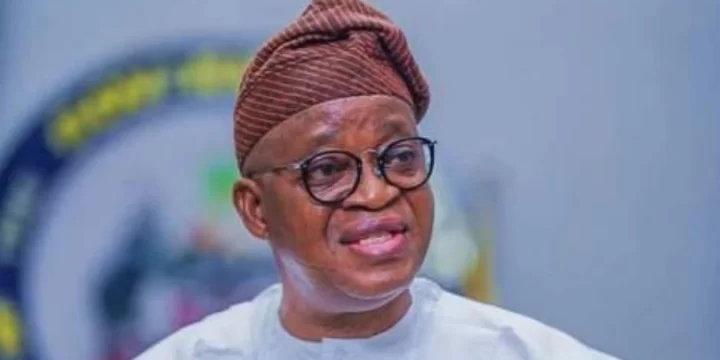The Minister of Marine and Blue Economy, Adegboyega Oyetola, has reiterated that Nigeria’s port modernisation agenda cannot succeed without strong collaboration and investments from the private sector. Speaking during a stakeholders’ engagement session in Lagos, the minister stressed that modernising the nation’s port infrastructure is critical to enhancing efficiency, boosting trade competitiveness, and positioning Nigeria as a maritime hub for West and Central Africa.
Oyetola explained that while government remains committed to creating enabling policies and providing the necessary regulatory framework, the scale of resources required for modernisation demands substantial private sector participation. He highlighted that many of the challenges facing the country’s ports—ranging from obsolete infrastructure, congestion, poor cargo handling capacity, and limited use of technology—can only be effectively addressed through Public-Private Partnerships (PPPs).

According to the minister, the Federal Government is prioritising reforms in port operations as part of its broader economic diversification strategy. He noted that a modern and efficient port system would reduce the cost of doing business, attract more foreign investment, and contribute significantly to Nigeria’s non-oil revenue base. He further assured stakeholders that the government is open to proposals from investors interested in financing and managing port facilities under transparent and mutually beneficial arrangements.
Oyetola added that efforts are underway to align Nigeria’s port systems with global best practices. This includes the adoption of digital platforms to streamline cargo clearance processes, reduce human interference, and eliminate corruption loopholes. He emphasized that digitalisation will also enhance transparency, improve turnaround times, and strengthen the country’s logistics value chain.
In his remarks, the minister noted that modernising Nigeria’s ports is not only about infrastructure but also about creating an efficient ecosystem where shipping lines, terminal operators, clearing agents, and other players can operate seamlessly. He cited examples from countries such as Singapore and the United Arab Emirates, where private sector-driven investments have transformed ports into global trade hubs.
Stakeholders at the forum welcomed the minister’s call, stressing that Nigeria must act quickly to overhaul its port system in order to remain competitive. Representatives of shipping companies, freight forwarders, and logistics providers identified persistent bottlenecks such as long cargo dwell times, cumbersome documentation processes, and limited connectivity between ports and hinterlands as major issues needing urgent attention.
Industry players also underscored the need for better road and rail infrastructure to facilitate cargo evacuation from ports. They argued that without efficient hinterland connectivity, port modernisation efforts may not yield the desired results. Some stakeholders further recommended the development of inland dry ports and logistics hubs to decongest Lagos ports and bring services closer to businesses in other regions of the country.
Oyetola assured the industry that the Federal Government is already in discussions with private sector partners on several port development projects. He disclosed that feasibility studies and financing models are being explored for the upgrade of key facilities, expansion of container terminals, and introduction of smart technologies. He also pledged that government would provide policy consistency, regulatory clarity, and security assurances to encourage private investments.
The minister emphasized that Nigeria’s maritime sector holds vast opportunities beyond cargo handling. He pointed out that the blue economy concept embraces fisheries, shipbuilding, marine tourism, offshore energy, and environmental sustainability. By modernising ports, Nigeria would create a gateway to harnessing these wider opportunities, generating jobs, and stimulating economic growth.
Economic analysts have also weighed in, noting that Nigeria loses billions annually due to inefficiencies in port operations. Delays in cargo clearance, diversion of shipping traffic to neighboring countries, and high logistics costs remain significant challenges. They argue that modernising ports through private sector involvement is not optional but imperative for Nigeria to boost trade competitiveness under the African Continental Free Trade Area (AfCFTA).
The Nigerian Ports Authority (NPA) has already initiated reforms in line with the minister’s vision. These include investments in automation systems, the introduction of electronic call-up systems for trucks, and collaborations with security agencies to reduce illegal activities around ports. However, industry observers believe that deeper structural changes are needed to unlock the full potential of Nigeria’s maritime economy.
Oyetola concluded by affirming that the Federal Government will remain a reliable partner in the journey toward port modernisation. He encouraged all stakeholders to embrace dialogue, innovation, and partnerships in building world-class port infrastructure for Nigeria. He maintained that the country has no choice but to modernise, as global trade dynamics increasingly demand speed, transparency, and efficiency.
The minister’s position aligns with the government’s broader economic agenda of leveraging non-oil sectors to drive growth. With ports serving as critical gateways to trade, experts agree that their modernisation will have ripple effects across manufacturing, agriculture, and services. If successfully implemented, the reforms could see Nigeria emerge as a maritime powerhouse, attracting transshipment business, reducing reliance on foreign ports, and improving its balance of trade.
For now, the spotlight remains on the private sector to take up the challenge and partner with government in driving Nigeria’s port modernisation. As Oyetola emphasized, the journey requires collective responsibility, and its success will determine how well Nigeria positions itself in the global maritime landscape.
Support InfoStride News' Credible Journalism: Only credible journalism can guarantee a fair, accountable and transparent society, including democracy and government. It involves a lot of efforts and money. We need your support. Click here to Donate
